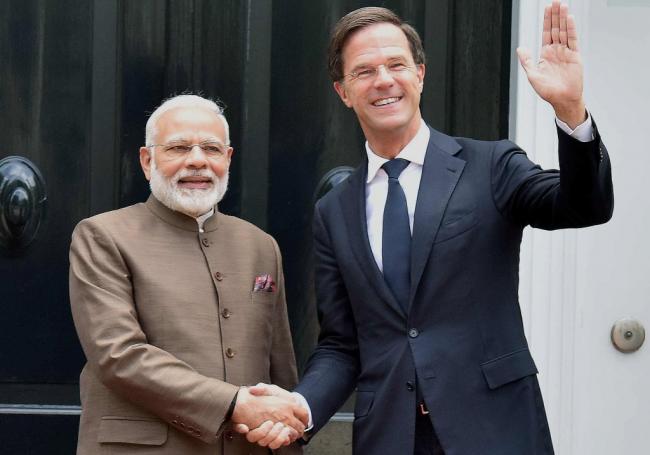
Prime Ministers of India and Netherlands call for holistic approach to eliminate terrorism
Both PMs issued a statement during Modi's visit to Netherlands.
Speaking about terrorism, the Prime Ministers reaffirmed their commitment to combat terrorism and prevent radicalization that could lead to violent extremism and reiterated the need for a unified and collective effort by the international community to eliminate terrorism through a holistic approach.
The two Prime Ministers even stressed that there can be no justification for acts of terror on any grounds whatsoever and agreed that there should be zero-tolerance on terrorism.
They affirmed that the fight against terrorism should not only seek to disrupt and bring to justice terrorists, terror organisations and networks, but should also identify, hold accountable and take strong measures against all those who encourage, support and finance terrorism, provide sanctuary to terrorists and terror groups, and falsely extol their virtues.
Both Modi and Rutte condemned the double standard in combating terrorism. In this regard, they called for early conclusion of negotiations on the Comprehensive Convention on International Terrorism.
The Prime Ministers agreed to continue their joint efforts to strengthen a free, open and secure cyberspace. They stressed the importance of the Global Conference on Cyberspace (GCCS) as a unique platform where strategic cyber issues are discussed in a representative high-level multi-stakeholder setting.
In the context of the upcoming Dutch membership of the United Nations Security Council in 2018, both leaders expressed their intention to closely collaborate on global and regional challenges.
They discussed their shared desire to make the United Nations, including the Security Council, more broadly representative, efficient and transparent. Prime Minister Rutte confirmed the Dutch support for a permanent seat for India in the Security Council. They discussed their shared desire to make the United Nations, including the Security Council, more broadly representative, efficient and transparent.
Both the leaders welcomed the ongoing cooperation in the field of science and technology, particularly in biotechnology. They appreciated the joint collaborations in the field of water and waste management, big data, crop sciences, public health and medical technology. They commended the ongoing projects in the field of water and waste management under the Dutch Indo Water Alliance Leadership Initiative (DIWALI) in Vadodara and Local Treatment of Urban Sewage Streams for Healthy Reuse (LOTUS) in Delhi.
The Prime Ministers noted a significant expansion in bilateral economic and commercial engagement. The Netherlands is the 5th largest source of Foreign Direct Investment for India. A vast array of natural synergies provides ample opportunities for complementarity: in many sectors, India’s needs match Dutch strengths and vice versa.
In Agriculture, Life Sciences and Healthcare, Ports and Logistics and Renewable Energy promising partnerships have already been established. A key ingredient in the Indo-Dutch cooperation is the use of innovation and technology to improve water and waste management, thus contributing to the Clean India campaign. Dutch agro-experts are involved in exploring ways to shift to crops that are less water intensive and will generate higher income for the farmer.
In this context, the Netherlands has created a consortium of fruit chain companies mainly working in hilly regions, creating a win-win situation, as India can develop its fruit sector in a faster pace with opportunities for Dutch companies and knowledge. The Prime Ministers also noted with satisfaction that more Dutch companies are planning significant investments in India, supporting the Make in India campaign.
Prime Minister Rutte reiterated his praise, as expressed during his visit to India in 2015, for the transformative economic initiatives introduced by Prime Minister Modi and the resurgence of the Indian economy. In the two years since their last bilateral meeting, it has become evident that Prime Minister Modi’s initiatives are bearing fruit.
The leaders reaffirmed that the Netherlands is uniquely placed as a preferred partner in India’s development in key sectors such as water management and clean water technologies, shipping and inland waterways, infrastructure development, port and airport upgrading, smart cities and smart transportation, high-tech materials and systems; renewable energy and power, sanitation and solid waste management, skill development, telecommunications, agro-processing and dairy farming, horticulture and floriculture, health, biotechnology, sports, insurance and banking.
With 20% of India’s exports to Europe entering through the Netherlands, the Prime Ministers discussed the role of the Netherlands as India’s ‘Gateway to Europe’. They assessed that this position is only expected to grow in the coming years as a result of developments in both India and Europe. In this context, India and the Netherlands have the intention to strengthen their cooperation in the field of mobility and migration.
The Netherlands hosts the second largest Indian diaspora in Europe. In this context, both Prime Ministers welcomed the strengthening of direct air connectivity between India and the Netherlands, which was set in motion after their last meeting and which will contribute to further deepening of people to people ties and business links. They also welcomed the growing number of Indian students and professionals in the Netherlands.
PM Modi invited the Netherlands counterpart to visit India.
Support Our Journalism
We cannot do without you.. your contribution supports unbiased journalism
IBNS is not driven by any ism- not wokeism, not racism, not skewed secularism, not hyper right-wing or left liberal ideals, nor by any hardline religious beliefs or hyper nationalism. We want to serve you good old objective news, as they are. We do not judge or preach. We let people decide for themselves. We only try to present factual and well-sourced news.







